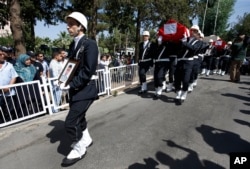In the past few weeks, the Islamic State has carried out deadly suicide bombings, prompting Turkey to join military operations against Jihadists as the threat of strikes by the militant group within Turkey continues to grow.
Last month’s deadly suicide bombing in Suruc was described by a Turkish official as sophisticated and well coordinated.
Turkish police say the bomber was a Turk and part of an IS cell operating for more than a year within Turkey.
Columnist Kadri Gursel of Al-Monitor website says Turkey is paying the price for failing to take the Jihadist threat seriously.
"Turkey has been turned into a Jihad highway. Jihadist activity and networking has been ignored, deliberately ignored," said Gursel. "In Turkey, recruitment activity of any Jihadist mostly, and in particular that of ISIS, has been ignored. As a result of this Turkey is now facing a growing terrorism threat emanating from ISIS."
Last week, in a parliament debate about the Suruc bombing, opposition parties accused the ruling AK party of using Jihadist groups to overthrow the Assad government in Syria, a charge it has denied.
Carnegie Institute visiting scholar Sinan Ulgen says the magnitude of the threat posed by Islamic State even influenced Turkish policy.
"For ISIS to have established over time a number of different structures, cells and networks within Turkey that would help it to retaliate against Turkey and Turkish interests ... that is the reason why Turkey initially decided to move cautiously against ISIS," said Ulgen.
Critics say that cautious approach to ISIS has led to several prominent IS members detained by Turkish security forces to be detained and then quickly released.
'Formidable task'
Since the Suruc bombings, the government has pledged to crackdown on Islamic State, but columnist Gursel warns it is now faces a formidable task.
"Islamic State recruited hundreds of Jihadists from Turkey, so it means that whoever is saying that Islamic State is exporting its war in Turkey is wrong. The war is within Turkey and one can imagine that terrorism acts would occur in the metropolises of Turkey. It would be a catastrophe for Turkey, the Turkish economy and Turkey’s social peace," said Gursel.
Turkey’s large western cities, and possibly its lucrative tourism industry popular with Western tourists are seen as possible targets. Although Turkish security forces are on high alert, observers say with IS believed to have a base of local supporters in the country, foiling such attacks will be difficult.





